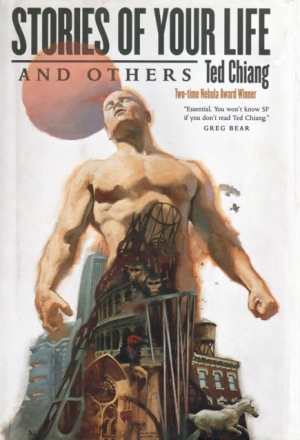Birthday Reviews: Ted Chiang’s “The Evolution of Human Science”

Ted Chiang was born in October 1967.
Chiang has won the Hugo Award four times, for his novelettes “Hell Is the Absence of God” and “The Merchant and the Alchemist’s Gate,” for his short story “Exhalation,” and for his novella The Lifecycle of Software Objects. Both of those novelettes also won the Nebula as did his novelette “Tower of Babylon” and his novella “Story of Your Life,” which was turned into the Hugo and Bradbury Award-winning film Arrival. “Exhalation” also won the British SF Association Award and the Grand Prix de l’Imaginaire. “Story of Your Life” earned the Theodore Sturgeon Memorial Award. He won the Sidewise Award for Alternate History for “Seventy-Two Letters.” Chiang has won the Hayakawa Award for “Understand,” “Story of Your Life,” and “Seventy-Two Letters.” The Lifecycle of Software Objects won the Italia Award. “Hell Is the Absence of God won the Kurd Lasswitz Preis. Translations of his stories “Story of Your Life,” “Hell Is the Absence of God,” “The Merchant and the Alchemist’s Gate,” and The Lifecycle of Software Objects won the Seiun Award. In 1992, Chiang won the John W. Campbell Award for Best New Writer.
“Catching Crumbs from the Table” originally appeared in the June 1, 2000 issue of Nature. When Chiang included it in his 2002 collection Stories of Your Life and Others (later reprinted as Arrival), he changed the title to “The Evolution of Human Science.” The story was translated into French for the collection La Tour de Babylone and into German by Karin Will and Michael Plogmann for the collection Das wahre Wesen der Dinge. It was translated into German again in 2017 for inclusion in the March issue of Spektrum der Wissenschaft.
Chiang’s “The Evolution of Human Science” is an interesting short story which doesn’t have any characters. It is written as an editorial appearing in a future issue of Nature which notes that humans are no longer making any breakthroughs in scientific endeavors. Metahumans who have been genetically modified are the ones who are pushing the boundaries while humans can, at most, synthesize the metahumans’ achievements for a broader audience. The humans aren’t always good at that since many of the successes of the metahumans, while beneficial to the mere humans, can’t really be understood by the unenhanced mind.
While Chiang could have written the story as a cautionary tale, it reads more like an understanding and embracing of evolution. Humans have been superseded by metahumans of their own creation. While that doesn’t mean that humans no longer have a role in society, it does mean the role has changed and Chiang’s editorial board is espousing that humans understand the difference and learn to contribute where they can, while understanding that since human ingenuity brought about the evolutionary step that created the metahumans, there is still time for human ingenuity to boost the rest of the human race before it’s too late.
Reprint reviewed in the collection Stories of Your Life and Others, by Ted Chiang, Tor Books, 2002.
 Steven H Silver is a sixteen-time Hugo Award nominee and was the publisher of the Hugo-nominated fanzine Argentus as well as the editor and publisher of ISFiC Press for 8 years. He has also edited books for DAW and NESFA Press. He began publishing short fiction in 2008 and his most recently published story is “Webinar: Web Sites” in The Tangled Web. Steven has chaired the first Midwest Construction, Windycon three times, and the SFWA Nebula Conference 6 times, as well as serving as the Event Coordinator for SFWA. He was programming chair for Chicon 2000 and Vice Chair of Chicon 7. He has been the news editor for SF Site since 2002.
Steven H Silver is a sixteen-time Hugo Award nominee and was the publisher of the Hugo-nominated fanzine Argentus as well as the editor and publisher of ISFiC Press for 8 years. He has also edited books for DAW and NESFA Press. He began publishing short fiction in 2008 and his most recently published story is “Webinar: Web Sites” in The Tangled Web. Steven has chaired the first Midwest Construction, Windycon three times, and the SFWA Nebula Conference 6 times, as well as serving as the Event Coordinator for SFWA. He was programming chair for Chicon 2000 and Vice Chair of Chicon 7. He has been the news editor for SF Site since 2002.